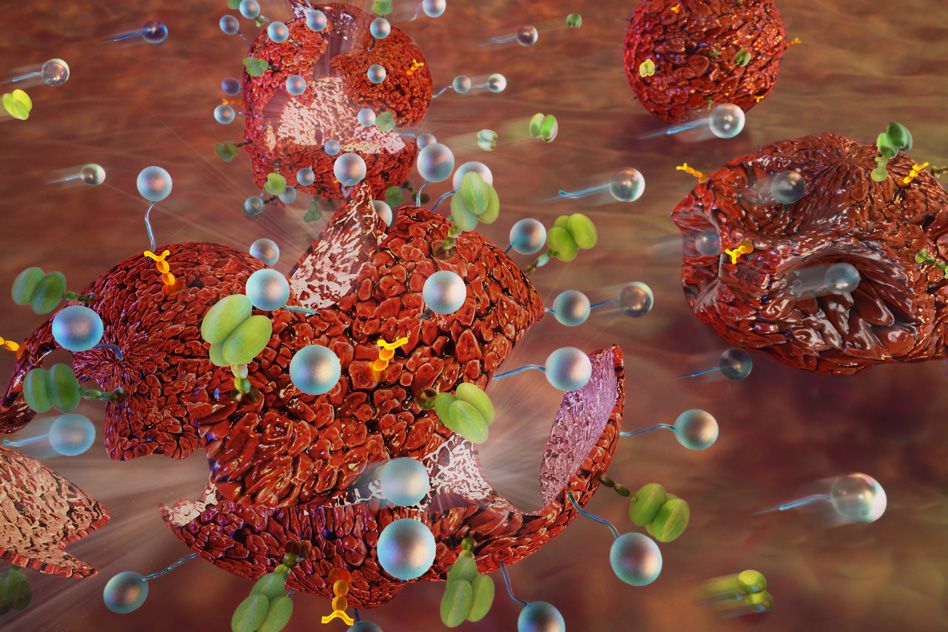news.mit.edu/2017/tethered-nanoparticles-tumor-cells-vulnerable-0320
Preview meta tags from the news.mit.edu website.
Linked Hostnames
17- 55 links tonews.mit.edu
- 19 links toweb.mit.edu
- 2 links totwitter.com
- 2 links towww.facebook.com
- 1 link tocalendar.mit.edu
- 1 link tocareers.mit.edu
- 1 link tocomms.mit.edu
- 1 link tocreativecommons.org
Thumbnail

Search Engine Appearance
Tethered nanoparticles make tumor cells more vulnerable
MIT researchers have devised a way to make cancer cells more susceptible to certain types of cancer treatment, by coating the cells with nanoparticles before delivering drugs. By tethering hundreds of tiny particles to the surfaces of tumor cells, the researchers made the cells much more vulnerable to attack by a drug called TRAIL that triggers cancer cells to commit suicide.
Bing
Tethered nanoparticles make tumor cells more vulnerable
MIT researchers have devised a way to make cancer cells more susceptible to certain types of cancer treatment, by coating the cells with nanoparticles before delivering drugs. By tethering hundreds of tiny particles to the surfaces of tumor cells, the researchers made the cells much more vulnerable to attack by a drug called TRAIL that triggers cancer cells to commit suicide.
DuckDuckGo
Tethered nanoparticles make tumor cells more vulnerable
MIT researchers have devised a way to make cancer cells more susceptible to certain types of cancer treatment, by coating the cells with nanoparticles before delivering drugs. By tethering hundreds of tiny particles to the surfaces of tumor cells, the researchers made the cells much more vulnerable to attack by a drug called TRAIL that triggers cancer cells to commit suicide.
General Meta Tags
10- titleTethered nanoparticles make tumor cells more vulnerable | MIT News | Massachusetts Institute of Technology
- charsetutf-8
- viewportwidth=device-width, initial-scale=1.0
- descriptionMIT researchers have devised a way to make cancer cells more susceptible to certain types of cancer treatment, by coating the cells with nanoparticles before delivering drugs. By tethering hundreds of tiny particles to the surfaces of tumor cells, the researchers made the cells much more vulnerable to attack by a drug called TRAIL that triggers cancer cells to commit suicide.
- keywordsNanoparticles, apoptosis, immunotherapy, polymers, Robert Langer, Michael Mitchell, Cancer, Research, Chemical engineering, Nanoscience, nanotechnology, Koch Institute, MIT Engineering, MIT
Open Graph Meta Tags
7- og:titleTethered nanoparticles make tumor cells more vulnerable
- og:imagehttps://news.mit.edu/sites/default/files/images/201703/MIT-Tethered-Nano-1.jpg
- og:descriptionMIT researchers have devised a way to make cancer cells more susceptible to certain types of cancer treatment, by coating the cells with nanoparticles before delivering drugs. By tethering hundreds of tiny particles to the surfaces of tumor cells, the researchers made the cells much more vulnerable to attack by a drug called TRAIL that triggers cancer cells to commit suicide.
- og:site_nameMIT News | Massachusetts Institute of Technology
- og:typearticle
Twitter Meta Tags
2- twitter:site@mit
- twitter:cardsummary_large_image
Link Tags
10- apple-touch-icon/themes/mit/assets/img/favicon/apple-touch-icon.png
- canonicalhttps://news.mit.edu/2017/tethered-nanoparticles-tumor-cells-vulnerable-0320
- icon/themes/mit/assets/img/favicon/favicon.ico
- icon/themes/mit/assets/img/favicon/favicon.svg
- image_srchttps://news.mit.edu/sites/default/files/images/201703/MIT-Tethered-Nano-1.jpg
Emails
1Links
91- http://calendar.mit.edu
- http://careers.mit.edu
- http://comms.mit.edu
- http://creativecommons.org/licenses/by-nc-nd/3.0
- http://engineering.mit.edu